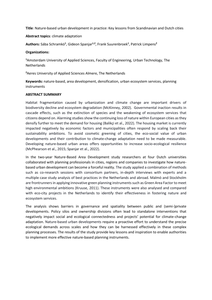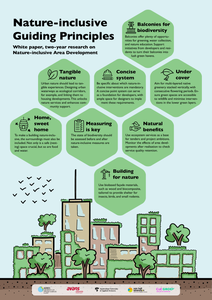Abstract from AMS Scientific Conference '24, Amsterdam, Netherlands.In the two-year Nature-Based Area Development study researchers at four Dutch universities collaborated with planning professionals in cities, regions and companies to investigate how nature-based urban development can become a forceful reality. The study applied a combination of methods such as co-research sessions with consortium partners, in-depth interviews with experts and a multiple case study analysis of best practices in the Netherlands and abroad.Keywords: nature-based, area development, densification, urban ecosystem services, planning instruments
DOCUMENT

Post-war urban neighbourhoods in industrialised countries have been shown to negatively affect the lifestyles of their residents due to their design. This study aims at developing an empirical procedure to select locations to be redesigned and the determinants of health at stake in these locations, with involvement of residents’ perspectives as core issue. We addressed a post-war neighbourhood in the city of Groningen, the Netherlands. We collected data from three perspectives: spatial analyses by urban designers, interviews with experts in local health and social care (n = 11) and online questionnaires filled in by residents (n = 99). These data provided input for the selection of locations to be redesigned by a multidisciplinary team (n = 16). The procedure yielded the following types of locations (and determinants): An area adjacent to a central shopping mall (social interaction, traffic safety, physical activity), a park (experiencing green, physical activity, social safety, social interaction) and a block of low-rise row houses around a public square (social safety, social interaction, traffic safety). We developed an empirical procedure for the selection of locations and determinants to be addressed, with addressing residents’ perspectives. This procedure is potentially applicable to similar neighbourhoods internationally.
DOCUMENT

Green Urban Solutions is de overkoepelende benaming voor innovatieve toepassingen van groen in stedelijk gebied, zoals bijvoorbeeld groene daken, groene gevels, indoor groen en specifiek ontworpen aanplant op pleinen en perken. Ondanks de vele waarden die Green Urban Solutions genereren en het brede scala aan stakeholders die hier belang bij hebben, ontbreekt het tot nog toe aan solide business modellen voor Green Urban Solutions waarin deze stakeholders gekoppeld worden aan de verschillende waarden die ze genereren. Het doel van dit onderzoek is om drie nieuwe business modellen te ontwikkelen en een advies te geven voor het betrekken van stakeholders om deze modellen te versterken en te verwezenlijken. Hiervoor is de volgende hoofdvraag opgesteld: ‘’Wat is het Nederlandse business model voor Green Urban Solutions dat de schakel vormt met de stakeholders waar ze waarde voor creëert?’’.
DOCUMENT

This paper examines how a serious game approach could support a participatory planning process by bringing stakeholders together to discuss interventions that assist the development of sustainable urban tourism. A serious policy game was designed and played in six European cities by a total of 73 participants, reflecting a diverse array of tourism stakeholders. By observing in-game experiences, a pre- and post -game survey and short interviews six months after playing the game, the process and impact of the game was investigated. While it proved difficult to evaluate the value of a serious game approach, results demonstrate that enacting real-life policymaking in a serious game setting can enable stakeholders to come together, and become more aware of the issues and complexities involved with urban tourism planning. This suggests a serious game can be used to stimulate the uptake of academic insights in a playful manner. However, it should be remembered that a game is a tool and does not, in itself, lead to inclusive participatory policymaking and more sustainable urban tourism planning. Consequently, care needs to be taken to ensure inclusiveness and prevent marginalization or disempowerment both within game-design and the political formation of a wider participatory planning approach.
MULTIFILE

The research focuses on the key role played by ‘collectives of makers’ from SMEs in urban transformations. Case studies are central. At a time when space in the city is becoming increasingly scarce, the pressure on space for work is increasing. Entrepreneurs of 6 best practices secure space for work by operating as a collective. By securing their (affordable) space for work, collective can yield added value for area development in urban environments. If applied to into a social investment businessmodel, entrepreneurs could 1. more clearly legitimise the position and relevance of SMEs in the city 2. make unprofitable end affordable (to be shared among the benefit-holders) 3. Offer SME collectives a permanent role in area development 4. Make better use of real estate, facilities and infrastructures (densify/stack/cluster) 5. Promote urban-mining and last mile of circular chains back to the city.We describe three specific preconditions that contribute to scaling up entrepreneurial collectives: 1) measuring their impact at building, area and city level, 2) embracing new forms of collaboration and 3) developing a long-term vision of workspace in the city. The perspective of the entrepreneur is central. But there is also a focus on the role of government, the necessary policy support and the tools to enable upscaling.
DOCUMENT

from the article: Abstract Based on a review of recent literature, this paper addresses the question of how urban planners can steer urban environmental quality, given the fact that it is multidimensional in character, is assessed largely in subjective terms and varies across time. The paper explores three questions that are at the core of planning and designing cities: ‘quality of what?’, ‘quality for whom?’ and ‘quality at what time?’ and illustrates the dilemmas that urban planners face in answering these questions. The three questions provide a novel framework that offers urban planners perspectives for action in finding their way out of the dilemmas identified. Rather than further detailing the exact nature of urban quality, these perspectives call for an approach to urban planning that is integrated, participative and adaptive. ; ; sustainable urban development; trade-offs; quality dimensions
DOCUMENT

With the rise of chronic diseases as the number one cause of death and disability among urban populations, it has become increasingly important to design for healthy environments. There is, however, a lack of interdisciplinary approaches and solutions to improve health and well-being through urban planning and design. This case study offers an HCI solution and approach to design for healthy urban structures and dynamics in existing neighborhoods. We discuss the design process and design of ROOT, an interactive lighting system that aims to stimulate walking and running through supportive, collaborative and social interaction.
DOCUMENT

Habitat fragmentation caused by urbanization and climate change are important drivers of biodiversity decline and ecosystem degradation (McKinney, 2002). Governmental inaction results in cascade effects, such as the extinction of species and the weakening of ecosystem services that citizens depend on. Alarming studies show the continuing loss of nature within European cities as they densify further to meet the demand for housing (Balikçi et al., 2022). The housing market is currently impacted negatively by economic factors and municipalities often respond by scaling back their sustainability ambitions. To avoid cosmetic greening of cities, the eco-social value of urban developments and their contribution to climate-change adaptation need to be made measurable. Developing nature-based urban areas offers opportunities to increase socio-ecological resilience (McPhearson et al., 2015; Spanjar et al., 2022).In the two-year Nature-Based Area Development study researchers at four Dutch universities collaborated with planning professionals in cities, regions and companies to investigate how nature-based urban development can become a forceful reality. The study applied a combination of methods such as co-research sessions with consortium partners, in-depth interviews with experts and a multiple case study analysis of best practices in the Netherlands and abroad. Malmö and Stockholm are frontrunners in applying innovative green planning instruments such as Green Area Factor to meet high environmental ambitions (Kruuse, 2011). These instruments were also analysed and compared with eco-city projects in the Netherlands to identify their effectiveness in fostering nature and ecosystem services.The analysis shows barriers in governance and spatiality between public and (semi-)private developments. Policy silos and ownership divisions often lead to standalone interventions that negatively impact social and ecological connectedness and projects’ potential for climate-change adaptation. Nature-based urban developments require a proactive effort to understand the precise ecological demands across scales and how they can be harnessed effectively in these complex planning processes. The results of the study provide key lessons and inspiration to enable authorities to implement more effective nature-based planning instruments.
MULTIFILE

Paper presented at EURAM 2019: Exploring the Future of Management, Lisbon. Solution ecosystems can help to solve or minimize societal problems. A wide range of different actors are involved in co-creating a solution. Together, they form a ‘solution ecosystem’. They co-create different forms of value for different stakeholder groups. They create value at the ecosystem level, for different stakeholder groups. Moreover, they create system-resources. Value capture and distribution among ecosystem actors can therefore be challenging. Moreover, little is known on the role of ecosystem orchestration and goal-alignment of ecosystem actors. In this paper, we shed light on these aspects with a case study of an emerging solution ecosystem that develops a circular urban area in the Netherlands, with the aim of tackling a number of societal problems. We explore the challenges this solution ecosystem faces with regards to value creation, value capture and distribution, ecosystem orchestration and goal alignment. We conclude with avenues for future research on solution ecosystems that enable sustainability transitions. Submission to track ST13_08 - The inner life of business ecosystems, http://www.euramonline.org/annual-conference-2019.html
DOCUMENT
Urban nature enhancement is a theme that needs to be considered across different scales. From pocket parks and façade-greening to urban green infrastructure, biodiversity thrives best through connectivity.In the SIA-project, Nature-inclusive Area Development, four universities of applied sciences - Aeres University of Applied Sciences, Avans University of Applied Sciences, Amsterdam University of Applied Sciences, and Van Hall Larenstein University of AppliedSciences- researched three levels of area development to accelerate the transition to nature-inclusive area development. The study consisted of three case studies: Waarder Railway Zone (building), Knowledge Mile Park (KMP - street - Amsterdam), and AlmereCentre-Pampus (area).
DOCUMENT
